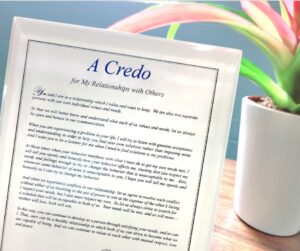As an L.E.T. Graduate, you’ve no doubt read or seen “A Credo for My Relationships with Others”. It’s a central part of every Gordon Model program–it’s really the heart and soul of it, what drives it. The Credo was written by Dr. Thomas Gordon in 1964. When he was interviewed about its’ creation, he shared this:
I was inspired to write the Credo by Kahlil Gibran’s beautiful poem in The Prophet , which begins with: “Your children are not your children…” I also wanted a brief summary of the key skills taught in P.E.T.–something at the end of the course to give to parents as a reminder of what they learned in the class.
It describes a way of taking responsibility for the part you play in your important relationships.
 You decide you will bring your full awareness to those relationships. In essence, you make a commitment to yourself that you will be aware of, will notice when the other person is having a problem. You won’t ignore it or pretend everything is okay. You will take responsibility for being a “sounding board” for the other person if they want to talk. [Active Listening]
You decide you will bring your full awareness to those relationships. In essence, you make a commitment to yourself that you will be aware of, will notice when the other person is having a problem. You won’t ignore it or pretend everything is okay. You will take responsibility for being a “sounding board” for the other person if they want to talk. [Active Listening]
Further, you will take responsibility for being aware of and finding ways to meet your own needs. When you feel blocked by the other person, you commit yourself not to repress your feelings or avoid letting the other know how their behavior affects you. The other person can count on you to tell them as clearly and sensitively as you can. [Confrontive I-Message]
Finally, when you have a conflict, you will take responsibility for working with the other person to find a solution that meets both your needs. Basically the Credo is a statement of accountability. You are holding yourself accountable for your part in making the relationship work. [Method III]
And so perhaps it’s time to read Dr. Gordon’s Credo again.
He often called it a blueprint for relationships. I like to call it Your Relationship GPS.
A CREDO FOR MY RELATIONSHIPS WITH OTHERS
You and I are in a relationship which I value and want to keep. Yet each of us is a separate person with our own unique values and needs and the right to meet those needs.
So that we will better know and understand what each of us values and needs, let us always be open and honest in our communication.
When you are having problems meeting your needs, I will listen with genuine acceptance and understanding so as to facilitate your finding your own solutions instead of depending on mine. And I want you to be a listener for me when I need to find solutions to my problems.
At those times when your behavior interferes with what I must do to get my own needs met, I will tell you openly and honestly how your behavior affects me, trusting that you respect my needs and feelings enough to try to change the behavior that is unacceptable to me. Also, when some behavior of mine is unacceptable to you, I hope you will tell me openly and honestly so I can try to change my behavior.
And when we experience conflicts in our relationship, let us agree to resolve each conflict without either of us resorting to the use of power to win at the expense of the other’s losing. I respect your needs, but I also must respect my own. So let us always strive to search for a solution that will be acceptable to both of us. Your needs will be met, and so will mine—neither will lose, both will win.
In this way, you can continue to develop as a person through satisfying your needs, and so can I. Thus, ours can be a healthy relationship in which both of us can strive to become what we are capable of being. And we can continue to relate to each other with mutual respect, love and peace.
Dr. Thomas Gordon
Copyright 1964, 1978 Gordon Training International

